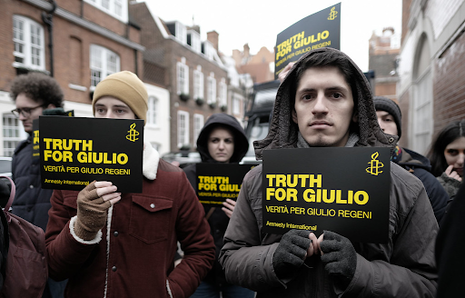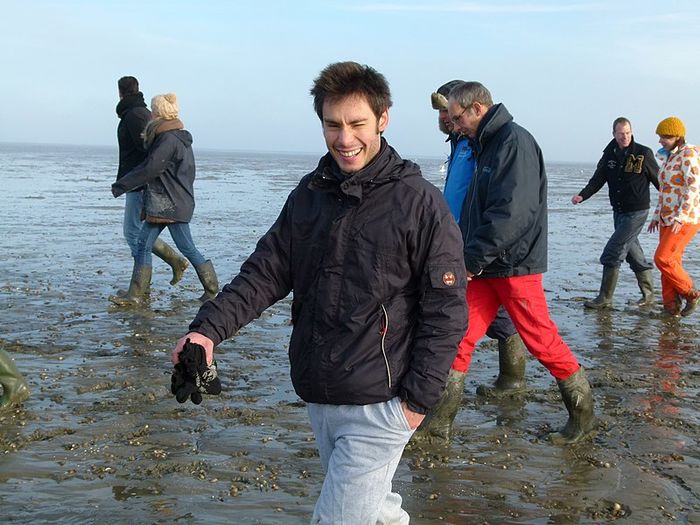Regeni inquiry arrives in Cambridge
The Italian parliamentary delegation, who are carrying out the inquiry, also held talks with the British government and the Foreign, Commonwealth and Development Office on Wednesday (29/09)

Content Note: This article contains brief mention of graphic physical injury.
An Italian parliamentary delegation has travelled this week to Cambridge and held talks with University of Cambridge representatives. The delegation are seeking answers to “some of [the] unanswered questions” surrounding the 2016 abduction and murder of 28 year-old PhD student Giulio Regeni in Cairo.
Regeni had travelled to Cairo in September 2015 to conduct research into the Egyptian economy and independent trade unions, before disappearing on 25th January 2016. His body was recovered nine days later in a ditch by a desert highway between Cairo and Alexandria, with an examination of his body revealing signs of burning, beating and mutilation, and an autopsy also revealing broken ribs and a brain haemorrhage.
Egyptian police initially claimed that Regeni had died in a car accident. Media at the time speculated that he had been swept up in a police raid against demonstrators marking the fifth anniversary of the beginning of the 2011 Egyptian Revolution. However, Italian prosecutors did eventually charge four members of Egypt’s national security agency in December 2020 for his murder and kidnapping after almost five years.
However, the four security officials charged by Italian authorities — Tariq Saber, Athar Kamel Mohamed Ibrahim, Capt Uhsam Helmi and Maj Magdi Ibrahim Abdelal Sharif — were cleared by Egypt’s public prosecutor Hamada al-Sawy on 30 December 2020. al-Sawy claimed at the time that “the perpetrator is unknown.” The trial by Italian prosecutors is subsequently due to take place in absentia, with the Egyptian state refusing to extradite the four suspects.
Erasmo Palazzotto, the president of the Italian parliamentary delegation, told the Guardian that the University of Cambridge is not under investigation, since “We all know those responsible for Giulio’s abduction, torture and murder”. Rather, they “believe [the University’s] help is needed [...] to help [...] find answers to some of the unanswered questions.”
Palazzotto further noted that, having been in contact with the University “for a few months [...] they have shown us their willingness to collaborate.” The delegation is expected to speak with representatives, including the Dean and professors specialising in the Middle East who had worked with Regeni.
The Guardian reported that the delegation also requested to speak with Dr Maha Abdelrahman, Regeni’s supervisor, who has been historically criticised over a perceived lack of cooperation with the inquiry into Regeni’s death. Palazzotto commented that her “reluctance to collaborate with the Italian prosecutors was a problem for the investigation”, adding: “I hope she agrees to speak with us. I hope she helps us understand what happened, and explains why she decided not to collaborate with the Italian authorities.”
In December 2016, an article in the Italian newspaper La Reppublica accused Dr Abdelrahman of insincerity in her questioning with the relevant authorities, and of encouraging Regeni to pursue research in an area which she allegedly knew could pose danger and which he was purportedly reluctant to pursue. This prompted several academics to publish a joint letter in her defence in the Guardian in 2017, claiming that Regeni had experience working in Egypt before approaching Dr Abdelrahman for supervision and that there was no “indication at the time that this research posed a threat to life.” The letter also denied allegations that Dr Abdelrahman was uncooperative with Italian authorities, claiming that she participated in interviews at Regeni’s funeral in February 2016 and wrote responses to questions on 15 June 2016, indicating that she would answer further questions in writing.
When Italian prosecutors charged the four Egyptian security officials in December 2020, the University released a statement soon after, defending Dr Abdelrahman from “malicious allegations” which recirculated over her supposed lack of cooperation with the initial inquiry. The statement fought back against “old and baseless assertions that she did not cooperate with the original investigation”, arguing that these “demonstrate[d] a fundamental — and continued —lack of understanding about the relationship between PhD students and their supervisors, which is one of support, critique and advice rather than instruction.”
When approached for comment on the arrival of the delegation for talks in Cambridge this week, a University spokesperson told Varsity: “The University has received a request from the Italian Parliamentary Inquiry into the death of Giulio Regeni to host a small delegation visiting Cambridge. We look forward to welcoming the delegation, and to engaging with its members openly and constructively.
“Like the Inquiry”, the statement continued, “the University of Cambridge is determined to find justice and truth for the family of Giulio Regeni.”
The spokesperson did not comment on whether Dr Abdelrahman participated in these talks.
During a virtual vigil commemorating the fifth anniversary of Regeni’s death in January this year, Daniel Zeichner, Member of Parliament for Cambridge, argued that the UK should “use [its] influence to get to the truth about cases like [Regeni’s murder]”, with a new UK-Egypt Association Agreement having come into effect on 1 January 2021.
The Italian delegation also planned to this week meet with representatives from the British government and the Foreign, Commonwealth and Development Office (FCDO), with Palazzotto saying in the Guardian: “It’s important to involve the British government. The death of Giulio has shown that the Egyptian regime does not spare Europeans from violence, to whom it reserves the brutal treatment that its citizens suffer every day. No one is safe from the violence of the Egyptian dictatorship. And the European and British governments cannot continue to have friendly and economic relations with a man like [President Abdel Fattah el-Sisi], pretending not to see what is happening in that country.”
The FCDO did not respond to a request for comment.
On the subject of this week’s delegation from Italy, a spokesperson for Zeichner told Varsity that “at the heart of this is a tragedy. A Cambridge student with his whole life ahead of him had his life brutally cut short. Giulio’s family, friends and colleagues need justice and truth. Since Giulio’s murder the Egyptian authorities have continued to consolidate their authoritarian rule with the military intervening in political life, restrictions on free speech, violence and intimidation. Sadly, throughout the last few years the Egyptian authorities have been unhelpful in finding Giulio’s murderers.”
The statement continued: “But this case has wider implications too. It is about academic freedom and about human rights. This visit will hopefully help Italian Parliamentarians to gain a greater understanding about the nature of academic research in the U.K., and about the relationship between PhD students and their supervisors.”
A spokesperson for Cambridge University Amnesty International (CUAI) told Varsity that they “reject the allegations made towards Dr Abdelrahman that she was insincere or uncooperative in her communication with Italian authorities, and strongly oppose statements made in some news outlets that have blamed the University for putting Giulio Regeni’s life at risk.”
They continued: “the delegation coming to Cambridge should be a grave reminder that the human rights abuses being committed in Egypt against researchers, journalists and activists are ongoing, with seemingly no effect on foreign relations. For example, Patrick Zaki has been detained since February 2020 and will be put on trial for “spreading false information”, with a five-year prison sentence on the line. Yet still, arms trade and friendly relations between Italy and Egypt continues.”
“What we hope most of all”, the spokesperson added, “is that the results of this delegation, combined with years of inquiry, will lead to those responsible for Regeni’s death in Egypt to finally be extradited and held accountable.”
The parliamentary commission will conclude their work on 3 October, with the content of the hearings with Cambridge representatives due to be published in over a weeks’ time.
Varsity additionally approached Amnesty International Cambridge City Group (AICCG) for comment.
 News / Deborah Prentice overtaken as highest-paid Russell Group VC2 February 2026
News / Deborah Prentice overtaken as highest-paid Russell Group VC2 February 2026 Fashion / A guide to Cambridge’s second-hand scene2 February 2026
Fashion / A guide to Cambridge’s second-hand scene2 February 2026 News / Downing Bar dodges college takeover31 January 2026
News / Downing Bar dodges college takeover31 January 2026 Comment / College rivalry should not become college snobbery30 January 2026
Comment / College rivalry should not become college snobbery30 January 2026 Lifestyle / Which Cambridge eatery are you?1 February 2026
Lifestyle / Which Cambridge eatery are you?1 February 2026










